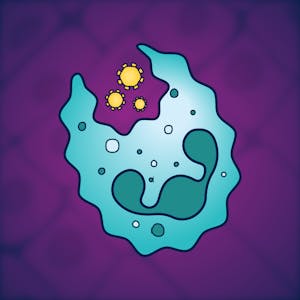Immunology: Innate Immune System delves into the swift and inherited defense mechanisms of our innate immunity. Through active researchers' guidance, you'll identify key cells, molecules, and defense mechanisms. The course also explores the influence of our microbiota on innate immune response and its communication with the adaptive system.
Certificate Available ✔
Get Started / More Info
Immunology: Innate Immune System modules cover the components of the innate immune system, the complement system, programming of innate immunity by the microbiota, antigen processing, and natural killer cells, providing a comprehensive understanding of our body's first line of defense.
The first module introduces the components of the innate immune system, including anatomic and chemical barriers, key mechanisms in response to microorganisms, and the role of toll-like receptors and cytokines.
In the second module, you will explore the complement system, including its components, functional proteins, and pathways, gaining an understanding of its crucial role in our immune defense.
The third module delves into the programming of innate immunity by the microbiota, addressing its protective role, influence on host defenses, and the importance of bacterial commensals on our immune system.
Module four focuses on antigen processing, specifically MHC Class I and Class II, and the pathways involved in antigen presentation, providing insights into the immune response to threats.
The final module explores natural killer cells and other innate lymphoid cells, covering their development, sub-groups, activation, and their role in immune responses to specific infections such as SARS-CoV-2.
Immerse yourself in the world of immunology with a specialisation that delves into the immune system, its failures, and their clinical implications.
Discover Best Practice Farming for a Sustainable 2050 Course equips learners with interdisciplinary knowledge and practical skills for sustainable farming. It emphasizes...
Music as Biology: What We Like to Hear and Why
This course explores the relationship between humans and the environment from a gender perspective, highlighting the contributions of women in environmental biology...